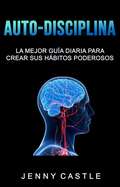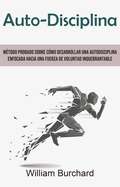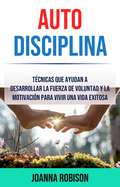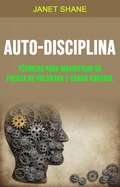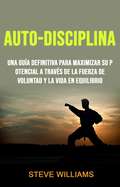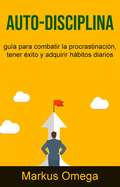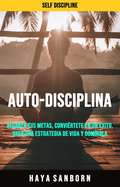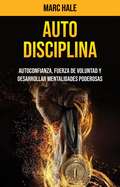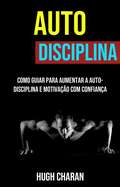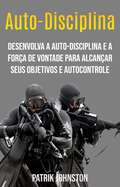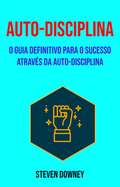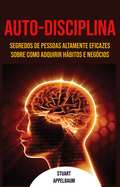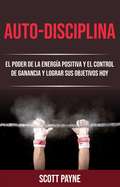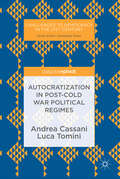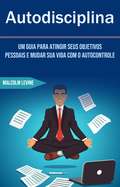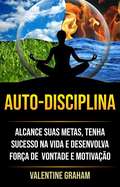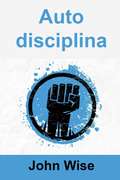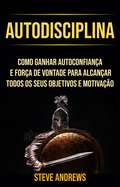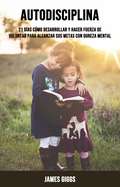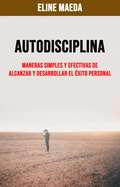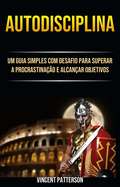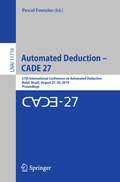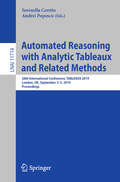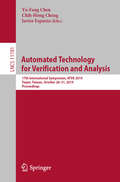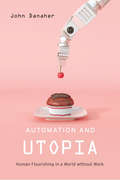- Table View
- List View
Auto-Disciplina: La Mejor Guía Diaria Para Crear Sus Hábitos Poderosos
by Jenny CastleEn este libro aprenderás cómo la autodisciplina puede cambiar tu vida y lo fácil que es desarrollar buenos hábitos y disfrutar del proceso. La autodisciplina es una de las herramientas que cuando se domina puede cambiar tu vida para siempre. Aprenderás a hacerte las preguntas correctas que te mantendrán avanzando hacia tus metas y alcanzarás todo tu potencial. Este libro le ayudará a identificar los pasos sobre cómo desarrollar buenos hábitos, autocontrol, y vencer la procrastinación y vivir una vida excepcional. Si crees que también estás sufriendo de problemas de autoestima, entonces has tomado el paso correcto cuando compraste este libro. Resolver el problema de la baja autoestima comienza cuando un individuo admite que hay, de hecho, un problema y luego busca activamente cualquier ayuda disponible. Por otro lado, si no tienes problemas de autoestima, sino que simplemente quiere aumentar sus posibilidades de éxito y realización sin llegar a ser demasiado orgulloso o jactancioso, este libro también te será de gran ayuda.
Auto-Disciplina: Método Probado Sobre Cómo Desarrollar Una Autodisciplina Enfocada Hacia Una Fuerza De Voluntad Inquebrantable
by Bill ThomasEste libro contiene pasos y estrategias demostrados sobre cómo comenzar a llevar una vida más exitosa mejorando la autodisciplina y la seguridad. En el mundo moderno en el que vivimos, todos queremos ser exitosos. Tenemos puestos de trabajo que no disfrutamos o deseamos avanzar y mejorarnos, o necesitamos bajar de peso, o lograr esto, lo otro o lo de más allá. Imagínate que te despiertas y puedes comenzar el día con el pie derecho todos los días, no solo cuando estás de buen ánimo. Los estudios han avanzado mucho en los últimos veinte años. Este libro te enseñará las mejores prácticas empleadas por pensadores visionarios, entre ellos, Elon Musk. Aprende a establecer micro metas para lograr los objetivos enormes que tienes para ti, casi sin esfuerzo. Descubre cómo se puede sacar provecho de un neurotransmisor para que tengas la disciplina de un espartano preparado para la guerra.
Auto-Disciplina: Técnicas Que Ayudan A Desarrollar La Fuerza De Voluntad Y La Motivación Para Vivir Una Vida Exitosa
by Joanna RobisonEste libro tiene información poderosa y procesable en cómo cambiar tu vida para mejor a través de consejos efectivos para ser más disciplinado. Diseñado como una plantilla completa de auto disciplina, este libro te provee con estrategias fáciles y efectivas para construir el estado mental correcto para que puedas frenar tus tentaciones y construir una buena vida para ti mismo. La auto disciplina puede ser definida como el auto control de nuestros sentimientos y la habilidad de llevar sus fallas y debilidades. Pero, ¿cómo afecta la auto disciplina en tu vida diaria? Bueno, puedes ser testigo de la auto disciplina en muchas maneras. Por ejemplo, si soportas la decepción y la frustración para alcanzar una meta más alta, piensa antes de realizar algo, asegúrate de terminar lo que comienzas, lleva a cabo tus planes y decisiones, o empújate a los límites de tu fuerza de voluntad, entonces ciertamente tienes auto disciplina. Todo comienza al descartar posesiones que no te traen gozo a tu vida. Marie Kondo delinea su método comprobado, incluyendo una orden de pasos, primero para descartar y después para guardar tus propiedades. Cuando esté hecho tendrás la energía para perseguir tus pasiones verdaderas en la vida y nunca volverás a un hogar desordenado.
Auto-Disciplina: Técnicas para magnificar su Fuerza de Voluntad y Ganar Control
by Janet ShaneLa seguridad en uno mismo es básicamente el coraje y positivismo para asumir cualquier cosa y todo lo que la vida le ofrezca. Caer dentro de un círculo de negatividad es uno de los mayores impedimentos que hace que la gente caiga de nuevo en la depresión, donde carecen de valentía y no creen en sí mismos. La confianza es bastante fácil de construir, pero llevarlo a la práctica cada día y ser optimista respecto a la vida es la parte más difícil. Yo he logrado esto. Las personas exitosas son capaces de aprovechar el poder de la autodisciplina para maximizar su productividad, hacer un uso óptimo de su tiempo, ejercer autocontrol y estar al volante de sus acciones. No son manejados por los eventos, las circunstancias u otras personas. Ellos sostienen el timón el mapa de sus propias existencias y determinan el curso de sus vidas en la dirección que quieren. Si, usted quiere alcanzar sus metas lograr éxito. Usted sabe que quiere llegar a destino. Pero ¿tiene usted el mapa para tal destino de éxito? Pues bien, este libro es la hoja de ruta para su triunfo.
Auto-Disciplina: Una guía definitiva para Maximizar su Potencial con Fuerza de Voluntad y Vida Equilibrada
by Steve WilliamsCuando tenga el control sobre sus pensamientos y acciones, es que su autoestima cobrará vuelo, y además aprenderá a cómo progresar para convertirse en una persona mejor y más fuerte. Aprenda cómo mejorar su autodisciplina y disfrute la vida con las pautas que este libro le indicará. La autodisciplina es la llave al éxito en todos los caminos de la vida. Si es capaz de dominar el arte de hacer lo que necesite hacer, cuando deba hacerlo, entonces TODO será posible para usted. En este ebook breve y de fácil lectura aprenderá la definición exacta de la autodisciplina, y por qué es tan importante. En este libro, descubrirá la forma precisa para crear confianza a través de ejercicios muy simples. También aprenderá a cómo cambiar su perspectiva de la vida y de ser más agradecido por lo que se tiene. El propósito principal de este libro es ayudarle a salir de su crisálida y a dar la cara al mundo. Esta es una limitación que puede superar fácilmente si está dispuesto a salir de su zona de confort. ¡Lleve su copia ya mismo dando clic al botón en la parte superior de esta página!
Auto-Disciplina: guía para combatir la procrastinación, tener éxito y adquirir hábitos diarios
by Markus OmegaEsta guía te dará una comprensión de lo que es la fuerza de voluntad para ayudarte a visualizar claramente lo que estás buscando. E ste libro te ayudará a entender tu propia fuerza de voluntad personal con el fin de ayudarte a avanzar hacia tus propios logros. Escribo esto porque durante los últimos años, yo también lo sabía. Siempre he querido hacer cosas grandes y locas en mi vida, y no me llevó mucho tiempo darme cuenta de que la autodisciplina era lo único que me detenía. Me ponía una meta, trabajaba muy duro por ella al principio y luego me desviaba de mi camino. Fracasé tantas veces y realmente quería resolver este asunto de la autodisciplina. Me fijé en los grandes del mundo - Steve Jobs, Michael Phelps, LeBron James, y me maravilló su increíble e imparable ética de trabajo y disciplina. Mientras que la autodisciplina es de hecho una herramienta esencial que nos ayuda a alcanzar el éxito, la prosperidad y la abundancia, muchos de nosotros luchamos constantemente para desarrollar y mantener la autodisciplina. Para muchos de nosotros, la autodisciplina no se encuentra fácilmente, a menudo terminamos confundidos, desorientados y desmotivados. Esto no sólo nos desvía de nuestro camino hacia el logro de metas, sino que también dificulta el desarrollo de nuestro verdadero potencial.
Auto-disciplina: Alcanza tus metas, conviértete en un éxito, crea una estrategia de vida y domínala.
by Haya Sanborn.Este libro es la escalera que cualquiera puede utilizar cuando estén decididos a escapar de su prisión de mediocridad. Este también es un libro que te empuja a través del techo de cristal que te mantiene dentro de tu zona de confort. Es importante entender que la disciplina es una habilidad que puede aprenderse y convertirse en hábito. Lo mismo va para la procrastinación. Mientras más procrastinas, más difícil se vuelve romper el hábito. Si prácticas continuamente la autodisciplina y ganas ímpetu con ella, tus "músculos de la disciplina" se vuelven más fuertes y te será más fácil tomar medidas en tu vida. Cuanta más acción realices, más resultados obtendrás. La autodisciplina es cuestión de autocontrol. Es manejar tu vida haciendo las cosas que necesitas hacer en lugar de las que quieres hacer. Claro, todos deseamos vivir una vida cómoda. Queremos tomar las cosas con calma. Pero la vida no es así, necesitamos sacrificar para obtener algo que valga la pena.
Auto-disciplina: Autoconfianza, Fuerza De Voluntad Y Desarrollar Mentalidades Poderosas
by Marc HalePasamos muchas horas deseando cosas. Infortunadamente, muy pocos de nosotros nos sentamos a reflexionar acerca de nuestras vidas y de ser agradecidos por las enormes metas que hemos logrado en nuestras vidas; tan solo vemos lo que no hemos realizado. Me gusta pensar en esto como considerar todo el tiempo, el vaso medio vacío. Con esa postura, puede apostar que no llegará lejos en la vida porque usted constantemente se autocastiga. Lo que usted puede desconocer es que desarrollar el hábito de la gratitud lo ayudará a superar sus constantes preocupaciones acerca de lo que no tiene y avanzar hacia la apreciación de lo que actualmente tiene. Cuando usted supera esto, empezarán a suceder increíbles cambios. Más exactamente, tener el hábito de la gratitud arraigado en usted, mejorará enormemente su salud mental. Su bienestar emocional mejorará, así como su vida espiritual. Pero, lo más importante es que lo llevará de un estado de carencia, hacia un estado de abundancia. Cuando esto ocurre, usted empieza a desarrollar la autodisciplina desde un punto de entusiasmo y apreciación general de la vida, en lugar de una ansiedad apresurada de lograr sus metas y de cubrir las faltas. Demos un par de pasos atrás. ¿Qué ocurre cuando usted vive en un estado de escasez? Bueno, se vuelve casi imposible enfocarse en mantenerse disciplinado y en lograr sus metas. Volverse autodisciplinado y mantenerse así requiere un aprecio saludable; requiere confianza y una mentalidad positiva.
Auto-disciplina: Como Guiar-se Para Aumentar a Autodisciplina e Motivação com Confiança
by Hugh CharanEsse livro contém passos e estratégias comprovadas sobre como usar a autodisciplina para garantir que você pode mudar a sua vida e atingir qualquer objetivo em que você colocar a sua mente. Todos possuem metas que querem alcançar na vida, mas muitas pessoas desistem de estabelecer a alcançar essas metas porque elas não têm ideia de como atingir o sucesso. A vida tem altos e baixos porque qualquer coisa que não tenha altos e baixos, não existe ou não está viva. A vida irá lançar desafios a você, de novo e de novo, e de novo. A diferença entre pessoas que obtêm sucesso e alcançam o seu potencial por completo e as pessoas que se fazem de vítima reside estritamente na sua mentalidade, o que as faz reagir de certa maneira aos problemas. O problema é que nós vivemos em um mundo cheio de vítimas, pessoas falam muito mais do que agem.
Auto-disciplina: Desenvolva a autodisciplina e a força de vontade para alcançar suas metas e o auto-controle
by Patrik JohnstonNós todos temos nossos defeitos de fraquezas. Há áreas nas nossas vidas em que sentimos que não temos controle algum e precisamos angariar forças para transpor obstáculos no nosso caminho. Precisamos mudar nossos defeitos que nos atravancam de maneira a tomar o controle de nosso próprio destino. Olhe no espelho e pense positivo. Tudo influencia, a maneira como nos vestimos, agimos, andamos, falamos e interagimos com as pessoas. Através da autodisciplina, eu acumulei a força de vontade e o estado mental de um visitante. Desistir não é uma opção. O que você pode fazer com um nível consistente de autodisciplina? Absolutamente nenhum sucesso pessoal ou talvez meta, pode ser alcançado sem autodisciplina. Este livro contém passos e estratégias comprovadas de como se tornar uma pessoa mais disciplinada de forma a desenvolver bons hábitos, ser mais confiante e alcançar suas metas. Ele também discute a importância da autodisciplina em vários aspectos da vida. O que você está esperando? Não espere mais! Role a tela para cima e clique no botão de comprar para começar a jornada para a vida dos seus sonhos!
Auto-disciplina: Faça o que quiser e quando quiser com disposição e motivação.
by Ernest KatherineAs pessoas que realizam grandes coisas devem seus sucessos não à sorte, mas à pura capacidade de controlar seus desejos e impedir-se de serem complacentes com o que têm atualmente. Sucessos e fracassos não devem ser baseados na fortuna ou na falta dela, porque estão mais ligados à maneira como vivemos através da autodisciplina Se você está pensando em comprar o livro, decidiu que é hora de mudar proporções significativas, uma mudança que pode levar apenas 30 dias para ser implementada, mas que durará por toda a vida. Sua convicção é admirável, mas, para sofrer essa mudança, você deve primeiro entender o que é autodisciplina e o que não é. Se você deseja alcançar o mesmo nível de sucesso, é necessário começar a desenvolver sua autodisciplina agora mesmo! Você tem que assumir o controle total de seus próprios pensamentos, emoções, comportamentos e hábitos. A autodisciplina, embora um pouco difícil para quem não a possui inerentemente, é o ingrediente chave para alcançar seus objetivos elevados. Algumas das pessoas mais bem-sucedidas do mundo até defendem isso. Pegue sua cópia hoje clicando no botão na parte superior desta página!
Auto-disciplina: Segredos De Pessoas Altamente Eficazes Sobre Como Adquirir Hábitos E Negócios
by Bill ThomasEste livro contém seis etapas simples e realistas sobre como se disciplinar. Este livro apresenta informações essenciais porque a disciplina é uma necessidade em sua vida. Cada capítulo explica instruções passo a passo sobre como desenvolver diferentes habilidades necessárias para alcançar a autodisciplina. Os seis passos mencionados neste livro são todos atingíveis e diretos. Ao se dedicar a seguir os níveis, há uma chance maior de você se tornar uma pessoa disciplinada que está querendo. As dicas são benéficas para sua melhoria de vida e excelência pessoal. Tudo que você precisa é de um compromisso para realizar todas as estratégias apresentadas no livro. Este livro de autoajuda é uma leitura obrigatória. Se você quer realizar mais, viver uma vida mais feliz e se transformar em uma pessoa melhor, então este livro é para você.
Auto-disciplina: Toma el control y logra tus objetivos hoy
by Scott PayneLa autodisciplina es la sustancia de cada día. Es el resultado del esfuerzo continuo e inconsciente. Hacer pequeños cambios en la rutina diaria puede enfrentarte a un sendero de grandes cambios. Los siguientes libros hablan de algunos pequeños cambios que pueden influenciar tu vida habitual: en términos generales, la autodisciplina viene con grandes premios. La vida es demasiado corta como para no alcanzar tus objetivos más grandes y cumplir tus deseos más profundos. Hay grandeza un poder sin explotar dentro tuyo que está esperando ser soltado. Desplega tu grandeza es una guía diseñada para llevarte desde donde estás actualmente en tu vida hacia donde quieres estar. La autodisciplina es una de esas cualidades que, cuando penetra una persona, puede respaldar todos los otros logros. Para muchos, puede ser algo que permanece tentadoramente fuera de alcance mientras para otros es algo que, en el mejor de los casos, es esporádica. Habrá muchas veces en la vida de una persona en la que la autodisciplina es algo deseable y habrá veces en que es una necesidad absoluta.
Autocratization in post-Cold War Political Regimes (Challenges to Democracy in the 21st Century)
by Luca Tomini Andrea CassaniThis book deals with post-Cold War processes of autocratization, that is, regime change towards autocracy. While these processes are growing in number and frequency, autocratization remains a relatively understudied phenomenon, especially its most recent manifestations. In this volume, the authors offer one of the first cross-regional comparative analyses of the recent processes of regime change towards autocracy. Building on an original conceptual framework, the two authors engage in the empirical investigation of the spreading of this political syndrome, of the main forms that it takes, and of the modes through which it unfolds in countries ruled by different political regimes, with different histories and belonging to different regional contexts. The research is conducted through a mix of research techniques that include descriptive statistical analysis, Qualitative Comparative Analysis and case study. This book will be of interest to a heterogeneous readership that encompasses the broader community of scholars, analysts, observers, journalists, and practitioners interested in political development and regime change in different geographical areas.
Autodisciplina - Um Guia Para Atingir Seus Objetivos Pessoais E Mudar Sua Vida Com O Autocontrole
by Malcolm LevineEste livro contém os métodos mais rápidos e fáceis para melhorar a sua autodisciplina. Neste livro você encontrará métodos que funcionarão rapidamente. Usaremos uma abordagem direta e poderosa para melhorar a autodisciplina e desenvolver uma incrível força de vontade. Você aprenderá mais do que antecipa. Os sistemas neste livro lhe darão as técnicas, insights e dicas para criar ou recriar essa habilidade. Sim, eu considero a autodisciplina uma habilidade. É desenvolvida por horas e horas de prática. Neste livro, você aprenderá todas as estratégias testadas e comprovadas que ajudarão você a desenvolver sua autodisciplina. Se você quer mudar sua vida, se você quer desenvolver a autoconfiança, se você quer alcançar as metas de sua vida assegurando-se de seguir seus planos, então vire as páginas e descubra como você pode se treinar para ser mais auto-disciplinado(a). Quando dominada e aplicada, a força de vontade pode ajudá-lo a ter uma vida mais produtiva e mais significativa. Na verdade, é o segredo para muito do que é bom na vida. É o que permite que você diga não a hábitos que são ruins para você. É o que faz com que você faça sacrifícios valiosos para o seu próprio bem.
Autodisciplina : Alcance Suas Metas, Tenha Sucesso Na Vida E Desenvolva Força De Vontade E Motivação
by Valentine GrahamVocê está prestes a descobrir que o força de vontade é uma ferramenta que está à disposição de todos. E isso pode ser comparado aos músculos do seu corpo que se fortalecem medida que são exercitados. Se conectado à cabeça isso pode ser percebido como força de vontade. Adquira hoje o seu exemplar, é só clicar no botão no topo desta página!
Autodisciplina: Come costruire una mente imbattibile e avere successo nella vita in 3 settimane
by John WiseL'autodisciplina è la capacità di controllare e gestire i tuoi sentimenti, azioni e comportamenti al fine di incanalarli in un uso produttivo. La ragione per cui l'autodisciplina è elusiva è perché viene trattata in astratto. Dove falliscono gli altri libri di dieta, questo non solo ti darà la sicurezza per iniziare il tuo percorso dietetico, ma ti insegnerà anche consigli e trucchi per sviluppare la mentalità autodisciplinata necessaria per il successo nella perdita di peso. Usa la mia esperienza unica, consigli semplici e consigli facili da capire, e conquisterai i tuoi obiettivi insieme a me come tuo allenatore dietetico. Una credenza comune è che il successo deriva dalla buona sorte o da un enorme talento. La verità è che molte persone di successo raggiungono le loro realizzazioni in un modo più semplice: attraverso un'autodisciplina molto forte. La famosa professoressa di Stanford, una ricercata ricercatrice e autrice, Carol Dweck mostra nel suo lavoro come il successo a scuola, nel lavoro, nello sport, nelle arti e quasi ogni area dello sforzo umano può essere drammaticamente influenzata dal modo in cui pensiamo ai nostri talenti e abilità. Scorri verso l'alto per acquistare la tua copia oggi!
Autodisciplina: Como ganhar autoconfiança e força de vontade para conquistar todos os seus objetivos e motivação
by Steve AndrewsEste livro pretende motivar e inspirá-lo a conquistar o seu sucesso. Além disso, irá aprender hábitos que são vitais para o sucesso empreendedor e a forma de os adotar. Na vida, sem autodisciplina, é extremamente difícil concretizar alguma coisa de concreto. A verdade é que todos os homens e mulheres que já viveram, e tiveram uma vida produtiva, conduziram as suas vidas de forma disciplinada. Por isso, quer aspire a tonificar o seu corpo, perder peso, desenvolver um negócio de sucesso, ser promovido ou tornar-se um ótimo parceiro e pai ou mãe, sem disciplina, não conseguirá fazê-lo de forma consistente durante um período alargado de tempo. Para onde quer que olhe, há obstáculos que bloqueiam o seu caminho. Ser bem-sucedido não significa evitar esses obstáculos, mas sim enfrentá-los e avançar. Para tal, você precisa de autodisciplina e de força de vontade para chegar ao fim. Precisa de ferramentas que lhe permitam ter essa autodisciplina e força de vontade. E a autodisciplina diária providencia-lhe essas ferramentas. Se está pronto para agir e mudar a sua vida para melhor, este livro vai decididamente guiá-lo na direção certa!
Autodisciplina: Cómo Desarrollar Fuerza De Voluntad Para Alcanzar Tus Metas Con Fortaleza Mental en 21 Días
by James GiggsLa disciplina es un concepto como cualquier otro y es probable que casi todos lo conozcan, pero ¿cuántos realmente lo entienden? ¿Cuántas personas han internalizado verdaderamente la esencia de este concepto? Podría decirte cuántas personas aplican la disciplina en sus vidas, sin embargo, solo debes ver a las personas más exitosas del mundo y darte cuenta que la autodisciplina ha desempeñado un rol vital en su éxito. En otras palabras, si deseas ser exitoso en la vida independientemente de lo que quieras hacer o tener, necesitas disciplina. Los ejercicios mentales que te comparto te iniciarán en el camino a tomar el control de tu vida tan pronto como comiences a practicarlos. Sentirás que gradualmente te irás disciplinando más y más con el tiempo y te sorprenderás de cuánto has dominado tus impulsos y has aprovechado tus energías para construir una vida mejor. Muchas personas saben que tienen un problema, pero no tienen idea de dónde recurrir por ayuda o por dónde comenzar. En este libro aprenderás que todo inicia con educación y no se requieren cambios masivos y decisiones abrumantes. Al tomar pequeños y manejables pasos cada día, y aprendiendo a pensar sobre tus metas apropiadamente podrás mejorar dramáticamente tu nivel de realización y éxito; y abrir tu vida hacia nuevos y excitantes talentos y caminos.
Autodisciplina: Maneras Simples Y Efectivas De Alcanzar Y Desarrollar El Éxito Personal
by Eline MaedaDescripción del libro: Alcanza la grandeza y mantén el control de tu vida, ningún sueño es demasiado grande; para conseguir esto debes desarrollar una "mentalidad de guerrero". Este libro te inspirará y te mostrará cómo mantener el control de tu mente y no volverte una víctima. Prepárate para la transformación de tu vida. Si puedes dominar tu poder de voluntad usando tu mente, puedes tener el mundo a tus pies. Los guerreros de Élite usan el eslogan "mente sobre materia" porque saben que la clave para desbloquear los secretos del éxito es dominar el poder de voluntad. Esto también es verdad respecto a la autodisciplina. Con el poder de voluntad viene una mentalidad positiva que puede ser utilizada de forma efectiva para imponer la auto-disciplina. Pero, ¿cómo se logra esto?¿Cómo funciona el cerebro? ¿Qué estás esperando? ¡Ya no esperes más! ¡Sube y haz click en 'comprar ahora' para comenzar el viaje a la vida de tus sueños!
Autodisciplina: Um Guia Simples Com Desafio Para Superar A Procrastinação E Alcançar Objetivos
by Bill ThomasNeste livro você encontrará técnicas e estratégias comprovadas que o impulsionarão aos níveis daqueles que parecem ter tudo. Iste é um guia passo a passo que lhe explicará o básico para desenvolter Audodisciplina que é a base para atingir seus objetivos e viver a vida que você merece. Onde você se posiciona na vida é determinado pelo número de vezes que você cai e levanta, e quanta dor e desconforto você pode suportar ao longo do caminho. O caminho à realização extraordinária e à vida digna de viver não é talento inato, mas foco, força de vontade, e ação disciplinada. A maioria dos livros de autocontrole ensina a básica abordagem emocionante à autodisciplina, mas com este poderoso livro de autodisciplina e força de vontade, você poderá compreender as barreiras ao sucesso, como desculpas, culpa, e recusa. Você terá o poder de ver a realidade como ela realmente é - e começar a dizer a si mesmo a verdade. Dando a si mesmo objetivos e escolhas simples, fáceis de atingir, você poderá reconectar sua mente para o sucesso!
Automated Deduction – CADE 27: 27th International Conference on Automated Deduction, Natal, Brazil, August 27–30, 2019, Proceedings (Lecture Notes in Computer Science #11716)
by Pascal FontaineThis book constitutes the proceeding of the 27th International Conference on Automated Deduction, CADE 27, held in Natal, Brazil, in August 2019. The 27 full papers and 7 system descriptions presented were carefully reviewed and selected from 65 submissions. CADE is the major forum for the presentation of research in all aspects of automated deduction, including foundations, applications, implementations, and practical experience.
Automated Reasoning with Analytic Tableaux and Related Methods: 28th International Conference, TABLEAUX 2019, London, UK, September 3-5, 2019, Proceedings (Lecture Notes in Computer Science #11714)
by Serenella Cerrito Andrei PopescuThis book constitutes the proceedings of the 28th International Conference on Automated Reasoning with Analytic Tableaux and Related Methods, TABLEAUX 2019, held in London, UK, in September 2019, colocated with the 12th International Symposium on Frontiers on Combining Systems, FroCoS 2019. The 25 full papers presented were carefully reviewed and selected from 43 submissions.They present research on all aspects of the mechanization of tableaux-based reasoning and related methods, including theoretical foundations, implementation techniques, systems development and applications. The papers are organized in the following topical sections: tableau calculi, sequent calculi, semantics and combinatorial proofs, non-wellfounded proof systems, automated theorem provers, and logics for program or system verification.
Automated Technology for Verification and Analysis: 17th International Symposium, ATVA 2019, Taipei, Taiwan, October 28–31, 2019, Proceedings (Lecture Notes in Computer Science #11781)
by Javier Esparza Yu-Fang Chen Chih-Hong ChengThis book constitutes the refereed proceedings of the 17th International Symposium on Automated Technology for Verification and Analysis, ATVA 2019, held in Taipei, Taiwan in October 2019.The 24 regular papers presented together with 3 tool papers were carefully reviewed and selected from 65 submissions. The symposium is dedicated to the promotion of research on theoretical and practical aspects of automated analysis, verification and synthesis by providing a forum for interaction between the regional and the international research communities and industry in the field. The papers focus on cyber-physical systems; runtime techniques; testing; automata; synthesis; stochastic systems and model checking.
Automation and Utopia: Human Flourishing in a World without Work
by John DanaherAutomating technologies threaten to usher in a workless future, but John Danaher argues that this can be a good thing. A world without work may be a kind of utopia, free of the misery of the job and full of opportunities for creativity and exploration. If we play our cards right, automation could be the path to idealized forms of human flourishing.
